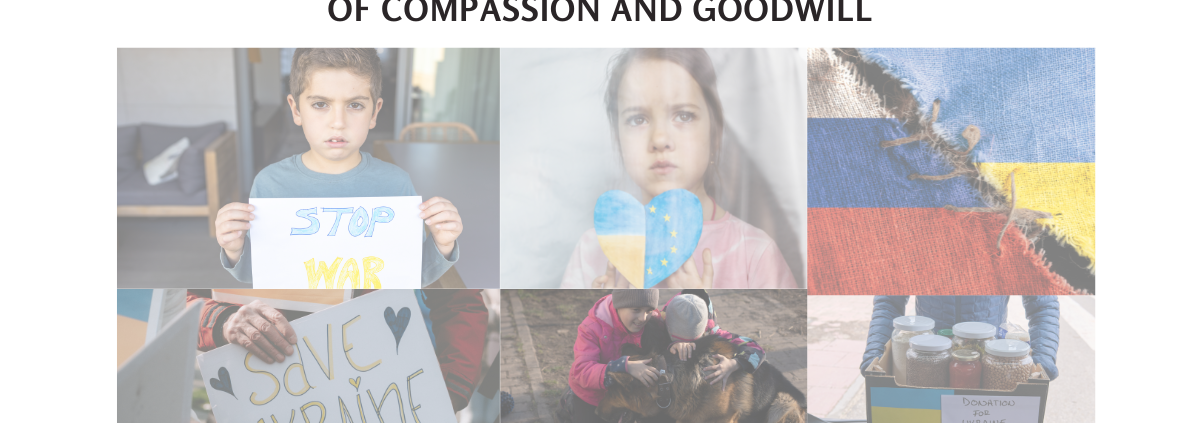Recently, I stumbled upon a video of an elderly Ukrainian woman confronting the intruding, heavily-armed Russian soldiers. Something she said during the brief encounter struck a chord with me: “Put these sunflower seeds in your pocket so they grow when you fall.” There was resistance in her demeanour and yet, in a poetic way, it was a goodwill gesture. The sunflower has become a symbol of Ukrainian resistance against Russian aggression.
Soon, I found myself looking for wartime stories of compassion, mercy, and going beyond the call of duty. Here are five stories that I believe cannot be shared enough, especially at a time when the need for goodwill is greater than ever.
Christmas night in the Ardennes Forest
During the peak of WW2, on Christmas eve, a German mother-son duo(1) found themselves in a bit of a fix as they heard a knock on the door of a hut they were taking shelter in. Opening the door meant trouble because the times and the location were such. Yet, gathering courage, the woman opened the door, only to find weary American soldiers who were in need of medical assistance. Mrs Elisabeth not only tended to their injuries but also offered them hot food by the fireplace.
The situation took a turn for the worse as she heard another knock on the door, this time from German soldiers. It was at this critical moment that she took a decision that led to one of the greatest instances of wartime goodwill. She went out, explained the situation to her countrymen, and requested them to keep their weapons aside and join the dinner. She also conveyed the same to the Americans. Soon, the belligerents sat face to face, ate, and spent the night with warmth, leaving their bitterness aside. And in that very moment, they were neither Germans nor Americans; they were only humans.
The Bushido code
During the second world war, if you wanted to see compassion, you would least expect it between the Japanese and the American soldiers. However, the opposite was true in an aerial dogfight between three Japanese aircraft and an American B-29(2). Cpl. Hideichi Kaiho and other pilots brought down the B-29, forcing Americans, including Lt. Raymond F. Halloran, to jump out in parachutes. However, Raymond was soon spotted, leading him to believe that he was going to be killed. Much to his disbelief, Kaiho not only didn’t try to kill him but also safeguarded him, enabling him to escape and survive the war. Five decades later, both men would meet again under different circumstances when Kaiho revealed that he was only adhering to the Bushido code — a Samurai moral code that posits treating the enemy with respect.
Enemies turned best friends
On December 20, 1943, decorated German pilot Hanz Stigler took off with a license to kill, for he had two good reasons to do so: The allied forces had killed his brother early on; he was just one kill away from the Medal of Honor. But life had different plans for him. Mid-air, he comes across an American B-17 bomber that is unusually quiet for a dogfight. Upon closer look, Stigler finds that the aircraft is hardly afloat, with many casualties and an ailing pilot Charles Brown. At the moment, Stigler, instead of claiming an easy kill, has a change of heart — he guides the B-17 up to the enemy territory, giving it a safe passage. Decades later, Stigler and Brown strike a wonderful friendship(3) that would outlive the bloody memories of the war.
Saved by the desert fox
German General Erwin Rommel wasn’t your typical nazi — he was respected by comrades and enemies alike, for he religiously adhered to his principles, which included treating enemies with respect. If he was ordered to do something that was in violation of his principles, he wouldn’t do it. During the peak warfare, he was brought two British captives, Wooldridge and Lane. Rommel could easily hand them over to the SS army, which was infamous for slaying its POWs. Knowing this first hand, Rommel instead decided to lodge them in the officer’s prison, where he would, at times, join them for tea. Nicknamed the “Desert Fox” — for his expertise in desert warfare — Rommel had more than one reason to kill both Lane and Wooldridge, as he was the victim of assassination attempts by the British Army. Yet, Rommel knew better than letting his hatred get the better of his principles. Both Lane and Wooldridge would go on to live to a ripe old age, often reminiscing how a principled Nazi gave them a second chance at life(4).
Compassion over cannon
Everard Hicks was a WW2 field medic assigned to tend to the injured. He took his job so seriously that not only did he care for his fellow wounded American soldiers but also ended up treating a German soldier. He went as far as getting the injured German to the camp, much to the dismay of his commanding officer. He was reprimanded and ordered to go back to the German-infiltrated village to secure it. However, upon his arrival, he was showered with flowers and approbations from the enemies, who willingly surrendered their arms. Everard’s first combat assignment would see him capture 300 German soldiers without firing a single shot. On the way back, he even got into a spat with a fellow American who had shot a German POW, before providing medical assistance to the latter and saving him too. Safe to say that Everard was truly one of a kind(5).
- https://historyofyesterday.com/how-the-germans-and-americans-shared-a-christmas-dinner-in-1944-fbefe912a4f
- https://www.dcourier.com/news/2017/jun/22/column-chivalry-over-tokyo-wwii-story-hap-halloran/
- https://www.airforcemag.com/article/valor-when-an-enemy-was-a-friend/
- https://www.bbc.com/news/uk-wales-south-east-wales-30151021
- https://www.med-dept.com/veterans-testimonies/veterans-testimony-everard-r-hicks/



